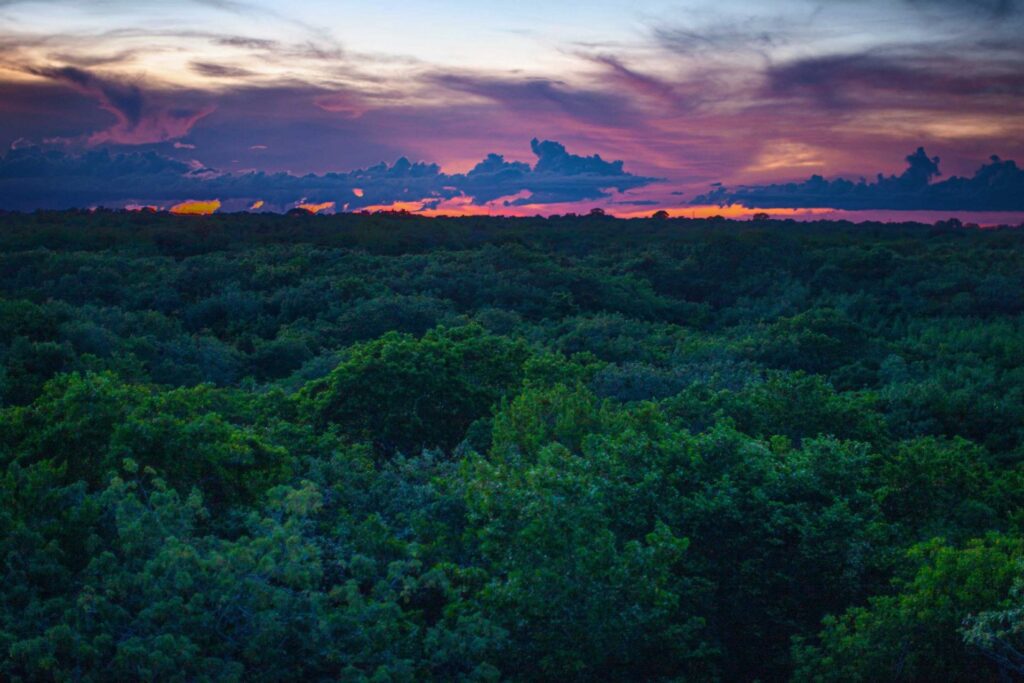

Earth Day came and went on April 22, but protecting the planet isn’t a one-day deal. As travelers continue to prioritize sustainability, here is a look at innovative programming plucked from the hotels, resorts, and travel providers on our client list.
Don’t Forget Your Snorkel Gear
With 24 miles of crystal-clear waters, sugar-white beaches, and vast wildlife on land and at sea, Destin-Fort Walton Beach, Florida is an ecological paradise all its own. From its growing artificial reef program and lionfish mitigation efforts to the new NuShore Project to support beach resiliency and The Gulfarium C.A.R.E. Center to spread awareness about sea turtle conservation, the destination features myriad sustainable travel experiences and educational activities for travelers of all ages. With more than 300 artificial reefs already planted in the Gulf of Mexico, Destin-Fort Walton Beach recently announced a five-year plan to become one of Florida’s best diving destinations by adding new large vessels to the reef area, installing the state’s only inshore reef program in Choctawhatchee Bay, creating beachside and shore-accessible ‘snorkel reefs,’ and more.
Give a Little to Give a Lot

Set between vibrant Zurich and the unspoiled countryside of Switzerland, The Dolder Grand is a luxurious city resort that deeply values sustainability, from avoiding food waste to maintaining an underground heating system that enables energy efficiency year round. The resort’s Cause We Care initiative invites guests to promote climate protection locally and globally and make their bookings climate neutral via voluntary monetary contributions to high-quality international climate protection projects, which the resort will double to invest in local sustainability measures.
Staying Sustainably in Style
onefinestay wants travelers to know that vacationing sustainably doesn’t mean sacrificing style and luxury. On top of 24/7 concierge and other personalized services, the company offers a selection of villas notable for their sustainable details. Try Hacienda Chekul on a beachfront in the Riviera Maya, with a lush green garden on the terrace, a sparkling infinity pool, and self-sufficiency through solar and wind power systems; Eco Seredib on St. John in the USVIs, with a ‘seed-to-plate’ garden, repurposed roof tiles on outside terraces, natural saltwater pool, and sustainable textiles in bedrooms; and Villa Zola on Santorini in the Aegean Sea, made of historic kilns that were carefully restored with eco-friendly materials and respect to traditional Cycladic architecture. The larger kiln is now a bright and airy kitchen, and the smaller a beautiful en suite bathroom.
Giving Back to the Community

Palmaïa – The House of AïA, a progressive wellness resort in Playa del Carmen, is committed to sustainability, eco-friendliness, and immersion in nature. Earlier this year, the resort launched DEPTH offering an experience for guests that directly benefits the surrounding Mayan community and organic agriculture projects that Palmaïa helped fund to boost the local economy and protect their ecosystems. Guests on DEPTH visit a beekeeper, an organic farmer, and a jam producer, and finish with a ‘Jungle-to-Table’ plant-based Mayan meal served in the traditional home of community leader Don Manuel, with seasonal produce prepared by his wife Doña Guadalupe.
Flying High for Low Emissions
Sometimes to make progress for the environment, you have to break a few records. Sentient Jet has prioritized its commitment to the world around us by instituting sustainability initiatives that resulted in the largest emissions offset by any private aviation company in 2021. Just 12 months after launching its sustainability initiative, which ensures that every flight flown by Sentient Jet Card owners is offset to be carbon and emissions neutral, the company has achieved a 300% offset across 30,000 legs, equivalent to 541,089 metric tons. The carbon offset goes beyond traditional aviation sustainability programs by offsetting all aviation emissions, including water vapor, aerosols, and nitrous oxide, which together account for two-thirds of aircraft emissions.
Getting Slick on Sustainability
Who knew cooking oil could be an agent of change? La Tourangelle, that’s who. The family-owned maker of artisan oils has been demonstrating its commitment to the environment in myriad ways: Its recycled PET bottles used for sunflower oil have saved 4.7 million grams of virgin plastic, or 470,000 single-use plastic water bottles, from landfills; its regenerative sunflower oil has captured 2.9 million pounds of carbon into the soil; and by using tin cans instead of plastic bottles, the company saves over 67,000 pounds of plastic per year while ensuring that its oils are more flavorful through protection from sun damage.
Saving the Forest for the Trees
With 2,200 acres in Montego Bay, Jamaica, The Tryall Club has plenty of room to practice sustainability. Intent upon preserving the land for future generations, the beachfront estate dotted with luxury villas goes out of its way to protect indigenous and rare plants, including 12 species of fruit trees and another 33 species of non-fruiting trees. Onsite forests offer shelter for more than 60 bird species that are native to Jamaica and the Caribbean. Meantime, Tryall Club has taken extra steps for Green Globe Gold certification and is proud of what it has achieved for the environment and its guests.
All of the Flavor, Zero KM
There’s dining on ‘local ingredients,’ and then there’s dining at Las Qolqas. Set in the ancient Andean town of Ollantaytambo in the Sacred Valley of the Incas of Peru, the haven of exploration, self-discovery, and luxury hospitality has adopted a ‘Zero KM’ approach to cuisine, with every handpicked ingredient on the menu at its functional greenhouse bar and restaurant, Pututu, organic, seasonal, and either cultivated by the community or in the resort’s organic orchard. Las Qolqas serves everything with sides of sustainability including a compost system that promotes specific biodiversity needs in the area; irrigation and solar systems to reduce water and energy waste; and space for just 50 guests to minimize impact and maximize conservation efforts.
Sustaining Land, Lots of Land
Set on 20,000 acres of Lowcountry, Montage Palmetto Bluff in Bluffton, South Carolina, has a thing about preservation. The resort has made thoughtful choices to enhance the natural beauty of the historic land around it, notably teaming with the non-profit Palmetto Bluff Conservancy to protect the lush maritime forests and winding tidal creeks that crisscross the region. The resort supports a number of research initiatives and invites guests to participate, tour with the Conservancy, attend monthly lectures, and join in activities such as nature walks with resident naturalist Cassandra Beato.
